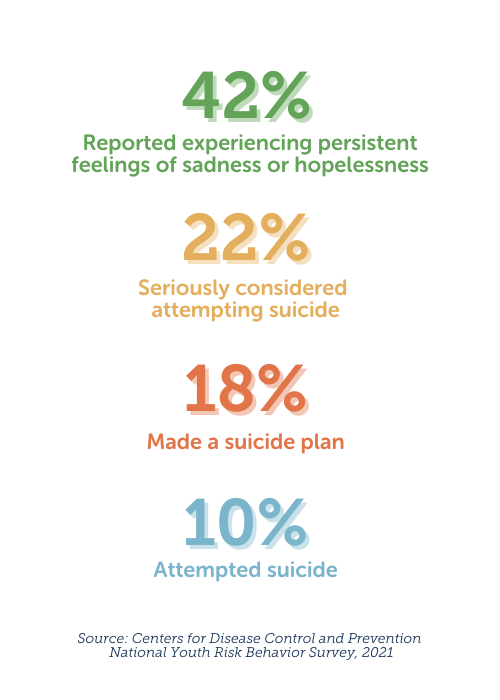Tips for Talking to Your Teen About Mental Health
Understanding mental health can be challenging for kids, and talking about mental health with kids can be particularly challenging for parents. The following are tips on how to start and continue the conversation about mental health with your child.

When talking to your teens:
- Focus on listening to what they have to say, regardless of how you might feel about the matter.
- Respond with empathy and validation while expressing calm and reassurance. A child's stress is just as real as our own and a sense of belonging and acceptance is at the center of their world, so reaffirm their feelings, especially those about friends and partners.
- Avoid judgement and personal opinions or lectures that could cause your child to feel defensive.
- Remind them how much they matter and how much you love them.
- Let your teen know they are not alone in experiencing sadness or emotional distress – bad times won’t last forever. Reassure them that "it's okay not to be okay" because everyone has rough patches. What is important is that they seek the support they need or find healthy coping skills to get through the tough times.
- Remember communication should be constant, open and honest.
- Take any mention of threats seriously. The American Academy of Pediatrics has recognized the following statements (or anything similar) as red flags that warrants you to seek professional help for you child:
- “I want to die.”
- “I don’t care anymore,”
- "Nothing matters."
- "I wonder how many people would come to my funeral?"
- "Sometimes I wish I could just go to sleep and never wake up."
- "Everyone would be better off without me."
- "You won't have to worry about me much longer."
A Safe Home Can be Lifesaving
If you are aware that someone in your home is struggling with mental health or has thoughts of suicide, a safe and secure home can be lifesaving. Keep all firearms, sharp objects including knives and razors, alcohol and medications stored safely, under lock and key, or move all firearms elsewhere permanently, or until the crisis has passed.
Concerning Signs in Teens
Signs of mental health struggles or thoughts of suicide can be subtle. They may not always be verbal, so nonverbal behavior, actions and social media habits can be telling. If you notice one or more of these warning signs, start the conversation and get help by calling the National Suicide Prevention Lifeline at 1-800-273-8255.
Signs of mental health struggles in teens may include withdrawal, changes in sleep, reckless behavior, personality change, substance abuse, physical pain, sudden mood changes, giving away possessions, loss of interest and neglect of personal appearance.